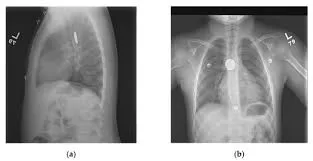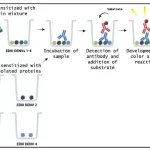A recent study from the University of Sydney has revealed the alarming dangers posed by button batteries when ingested by small children. These small, disc-shaped batteries, commonly used to power various household items, can cause serious injuries and even death among toddlers who accidentally swallow them.
The research team, led by Professor Christopher Tran, analyzed over 400 cases of button battery-related injuries worldwide. They identified several critical factors that contribute to the severity of these incidents: the child’s age, the size of the battery, and the time taken to diagnose the ingestion. These factors can create what Tran describes as a “perfect storm,” leading to devastating consequences.
“Clinicians should be vigilant for the possibility of button battery ingestion when treating young children presenting with acute onset respiratory or gastrointestinal symptoms,” Tran urged. He explained that when a child swallows a button battery, it can trigger a chemical reaction in the esophagus, creating a caustic solution that burns and dissolves tissue.
The study found that children who did not have the battery removed within six hours were nearly eight times more likely to die. The most vulnerable group was children under the age of two who had ingested a button battery with a diameter of at least two centimeters. In these cases, the risk of severe injury or death was particularly high.
The findings also revealed that approximately 26% of injuries from button battery ingestion resulted in burns to the child’s esophagus, with 23% of these cases being extremely severe. The burning can be so intense that it can create a hole in a major vein or artery, leading to fatal blood loss. Tragically, nearly 9% of the complication cases studied resulted in death, with bleeding being the most common cause.
Button batteries are found in a growing number of everyday household gadgets, including watches, hearing aids, remote controls, and toys. However, their small size and shiny appearance make them particularly attractive to inquisitive young children, who may inadvertently swallow them or insert them into their mouths, noses, or ears.
The initial symptoms of button battery ingestion can be subtle, often mimicking other common childhood illnesses. Choking, difficulty feeding, and coughing are some of the first signs, but as time progresses, symptoms such as vomiting and drooling may appear. These symptoms can be easily mistaken for conditions like gastroenteritis or respiratory infections, potentially delaying the diagnosis and increasing the risk of severe complications.
In response to these findings, the researchers are calling for increased awareness among parents and caregivers about the potential risks associated with button batteries. They emphasize the importance of storing batteries safely out of children’s reach and ensuring proper disposal to prevent accidental ingestion.
As the use of button batteries continues to rise in households worldwide, this study serves as a stark reminder of the potentially fatal consequences of these seemingly innocuous objects. The researchers hope that their work will lead to better prevention strategies and prompt, life-saving interventions for young children at risk.











